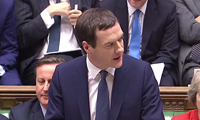

Yesterday (16 March), Chancellor George Osborne delivered the 2016 Budget, announcing a variety of measures concerning topics from soft drinks to oil and gas, but the Chancellor had relatively little to say on housing this year.
However, there were plenty of announcements that will have a considerable effect on the industry. Not least of these, as the Royal Institution of Chartered Surveyors (RICS) noted, was the announcement of a reform to Stamp Duty Land Tax on non-residential property transactions (moving from a slab system to a marginal regime), means a reduced tax burden and subsequently the possibility of stimulating investment in a sector which has seen a notable drop off in the past six months.
The British Property Federation (BPF) believes the increase to the highest rate (5% above £250,000) will have negative repercussions. Melanie Leech, chief executive of the BPF, said: “Commercial property investment can often act as the catalyst for regional growth and as the economy has recovered investment has been spreading out from London to the rest of the UK, but will now undoubtedly slow down. The real setback in today’s announcement is that development in places like the Northern Powerhouse and Midlands’ Engine will now be held back as a result of this out-of-the-blue raid on commercial property transactions.”
The Budget also featured considerable announcements for investment into infrastructure nationwide, from developments in the North to confirmation of Crossrail 2 to improve transport links in London.
Dr Diana Montgomery, chief executive of the Construction Products Association, said: “The Chancellor has rightfully recognised the value of infrastructure investment, both for the present and future generations’ benefit. The government’s support for the National Infrastructure Commission is encouraging and the list of projects given the green light such as HS3, Crossrail 2 and numerous other schemes across the country will please everyone in the construction supply chain.
“Still, we are very mindful that announcements are one thing but spades in the ground are another thing altogether. We therefore welcome the announcement of a National Infrastructure Delivery Plan, which we hope will provide clear, short-term delivery details for major projects and give manufacturers and builders the confidence they need to invest in skills and manufacturing capacity.”
In response to the lack of Budget matters regarding housebuilding, the Federation of Master Builders (FMB) noted that this Budget may prove to be a missed opportunity in the government’s race against time to meet its own housing targets.
Brian Berry, chief executive of the FMB, said: “The government has set itself a target of a million new homes by 2020. That is rightly ambitious, but the continuing gap between what’s being built and what needs to be built makes hitting that target more difficult by the day. We recognise that the government is working on a number of fronts to speed up the planning process and intervene to support first time buyers, and some of the measures in today’s Budget are welcome steps forward. Yet these announcements are limited in scope and won’t signal the step change that we need to see.”
“Measures announced in today’s Budget will go some way towards stimulating housebuilding in the UK but it’s disappointing the lack of new initiatives directly applicable to providing a long term solution to the chronic housing shortage,” said Phil Harris, head of sales at BLP Insurance.
“Stones remain unturned and significant challenges still exist for the UK housing industry, including the current skills gap and a shortage of traditional building materials. In the absence of long-term solutions to all of these headwinds to the housing shortage, they will continue to have an adverse impact on the speed at which new homes can be built.”